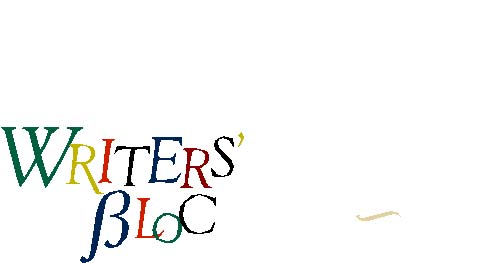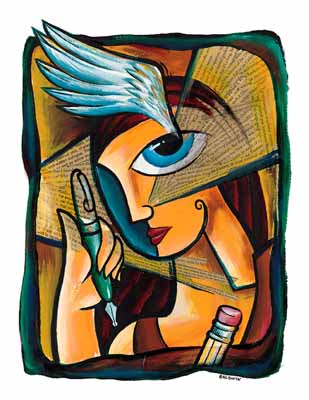


Students who enter the M.F.A. program with the naive assumption that it will a) turn them magically and painlessly into writers or b) launch their careers "are in for a rude awakening," says Elizabeth Dye, a second-year fiction student. Book agents and editors are not likely to flock to your doorstep upon graduation, Dye points out. In fact, waiting tables is likely to net more money than putting pen to paper for years after graduation.
Why, then, do students pledge the considerable cost in both time and money to immerse themselves in a discipline so slow to pay off, if at all? They come because they have something to say, according to Charles Johnson, who holds the S. Wilson and Grace M. Pollock Professorship in Creative Writing.
"They have something to say that they haven't seen said and their motivation is to say it,'' Johnson says, borrowing an idea from Jean Paul Sartre. "This program is part of finding out what it is they have to say that no one else has been able to put down exactly right. It's the beginning of a lifelong process, of enlightenment."
"It's kind of like being in a store where there are tons of clothes but none of them look right to you. You try some on, you look closer but what you need is just not there,'' Dye explains. "There is a kind of writing I have never seen before that I want to see so I guess I have to write it. I see this as two years to crystallize that idea of the kind of thing I want to write."
Many students come because they simply don't have all the tools necessary to recreate their thoughts and stories on paper. Former student Guterson, winner of the 1995 PEN/Faulkner Award for Fiction wfor his novel Snow Falling on Cedars, is most succinct on this issue. Of the UW creative writing program, Guterson says simply: "It's where I learned to write.
"Writing is like any other creative process, the components need to be learned,'' he says.
In two-hour workshops, students learn step-by-step the skills that transform good writing, or simply good ideas, into great writing: development of interesting characters, well-planned plot, challenging and appropriate symbolism, nuance, metaphor, well-written dialogue. They are urged and pushed to read the work of classic writers as well as fellow students critically and to receive criticism openly. While providing a steadying hand, teachers are careful not to ground students in their own agendas or styles of writing.
"I've found guidance when I wanted guidance and freedom when I wanted that,'' says student Manju Thapa. "There is no pressure to conform to one style of writing at the expense of my own stylistic impulses. All students are challenged to set their own goals and meet them on their own, which is the only way, perhaps, that writing can be taught. The instructors have an excellent sense of when to push a student and when to leave the student alone."
Students learn how to ask critical questions of themselves and others, how to challenge opinion and redirect their work in the effort to perfect it. With five instructors in the poetry and five in fiction--not to mention 10 divergent teaching and writing styles--students are in a constant process of redirection and revision.

"Each of us is probably considered individually bizarre or eccentric and yet we balance each other out,'' David Wagoner says of the program's unusually large faculty. Wagoner is author of 26 books of poetry and fiction. He won one of America's highest poetry honors, the Ruth Lilly Poetry Prize, in 1991.
"I encourage my students not to believe me or take my opinions on faith,'' he says. "If they disagree, I tell them to seek other opinions and to offer some reason for their disagreement."
Defending your work is perhaps the best way to critique it, Thapa says. "By our exposure to each other's writing and criticism ... we not only see the thematic and technical choices our peers have made, but have to defend the choices we have made.''
According to teacher Colleen McElroy, students learn to have a critical eye for what is on the page and how each passage reflects the writer's intent.
Before analyzing, students must open themselves to affectation: "You read a poem that affects you and for the first five minutes you allow yourself to feel that,'' says McElroy, author of eight books of poetry and two collections of short fiction. "Then you must do a closer reading of the work, to find out why the poem impacted you."
Finding Your "Voice": It's the Most Important
Trick
Balancing Act: Professors Take on Teaching
and Their Own Writing
Top Ten Faculty
for Top Ten Program
Send a letter to the editor at columns@u.washington.edu.